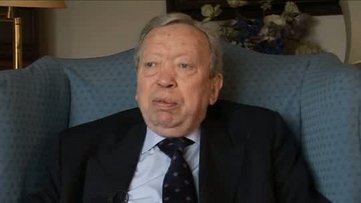NEXT STORY

It's an advantage not to be a writing editor
RELATED STORIES

NEXT STORY

It's an advantage not to be a writing editor
RELATED STORIES



And of course, frankly, being an MP is not, and a lot of people won’t like this, but it is not really a full-time job, however assiduous you are with your constituency. If it were a full-time job you couldn’t possibly be an MP and be a minister. Because a minister is a full-time job. And I think most politicians think that the only thing that counts is actually, you know, being in charge of a government department. And that’s what you wait for and that’s what you hope for. And, of course, in a sense, you know, you have a better chance of getting there than perhaps you do, as a journalist of becoming an editor, because there are what? Now about 23 members of the cabinet, they’ve all got departments to run, and they’re not… well, they’re… I don’t think there are 23 national newspaper editors. Obviously, with provincial ones, there are, but if you want to edit a national newspaper, you’ve got less chance, really, than if you want to be a cabinet minister.
But I don’t know. I suppose the fascination started off with, as I say, wanting to be a politician myself, then realising, and accepting that it wasn’t going to work, because the moment I suppose I went to the New Statesman to... in 1961... although it was a left-wing paper, I think that people thought, well, you know, he’s decided to be a journalist. And it was all right when I was on Reynold’s News, because that was okay, I was a Labour candidate at the same time, but I had to give that up when I went to work for The Guardian, because, quite rightly, Alastair Hetherington, the editor of The Guardian made it a condition of my employment that I must give up being a Labour candidate. He said, 'Look, I may believe that you’re being straight and honest, but the readers won’t'. The readers will write in and say, can we be surprised that your reporter writes... because in those days we didn’t have any by-lines... as we all know, he is himself a prospective Labour candidate. He said, 'I can’t have that, so you must sacrifice it and give it up'. And it wasn’t a great sacrifice, because it wasn’t a seat I had the faintest hope of winning. But I think from that moment on, I realised that you couldn’t ride the two horses. So, to be fair, to my own folly, I suppose, I did, when I left the New Statesman as editor, which I became in 1972 and stayed there six years, when I left in 1978, I did make some rather timid attempts to, sort of, get back on to the political horse and wrote off to one or two constituencies and was even interviewed here and there, but never, I think, at the level of a full selection conference.
But it became clear to me that, such was the suspicion of journalism and of the, sort of, you know, anti-Labour bias of all journalists, that it wasn’t going to succeed. And when it became clear that I wouldn’t have got a seat in the 1979 election, I gave that aspiration up. Thank goodness I did, because stretching ahead, though I didn’t know that at the time, were 14 years of Labour… 18 years, no 18 years of Labour in opposition. And I think that I would have felt pretty frustrated if, at the age of 46, I’d gone into the House of Commons and had to sit there until I was over pensionable age, 65, knowing I’d never get office because simply the tide was not with the Labour Party at that time. It wasn’t until 1997 that Tony Blair won the election of that year, ending an 18-year exile from power of the Labour Party. And if I had gone into the House at the time… and some of my friends tried very much to help me. People like Roy Hattersley tried very hard on my behalf, and kind of people like that. Then, you know, what I’d have sentenced myself to would have been much less rewarding than running the New Statesman had been. And indeed, then later on, which I went on to edit The Listener and then I went to The Observer, so I think they’d have been much less fulfilling years than they were by returning to journalism.
A distinguished British political observer, Anthony Howard (1934-2010) wrote for 'The Guardian', 'The Sunday Times' and 'The Observer' for over 40 years, during which time he has commented on the historical significance of global political issues. He was also editor of 'The Listener' and 'The New Statesman', and a reporter on both 'Newsnight' and 'Panorama'. He was awarded the CBE in 1997.
Title: Accepting that I would not become a politician
Listeners: Christopher Sykes
Christopher Sykes is a London-based television producer and director who has made a number of documentary films for BBC TV, Channel 4 and PBS.
Tags: New Statesman, Reynold's News, The Guardian, The Listener, The Observer, Hector Alastair Hetherington, Anthony Charles Lynton Blair, Roy Sydney George Hattersley
Duration: 4 minutes
Date story recorded: November - December 2008
Date story went live: 21 May 2018